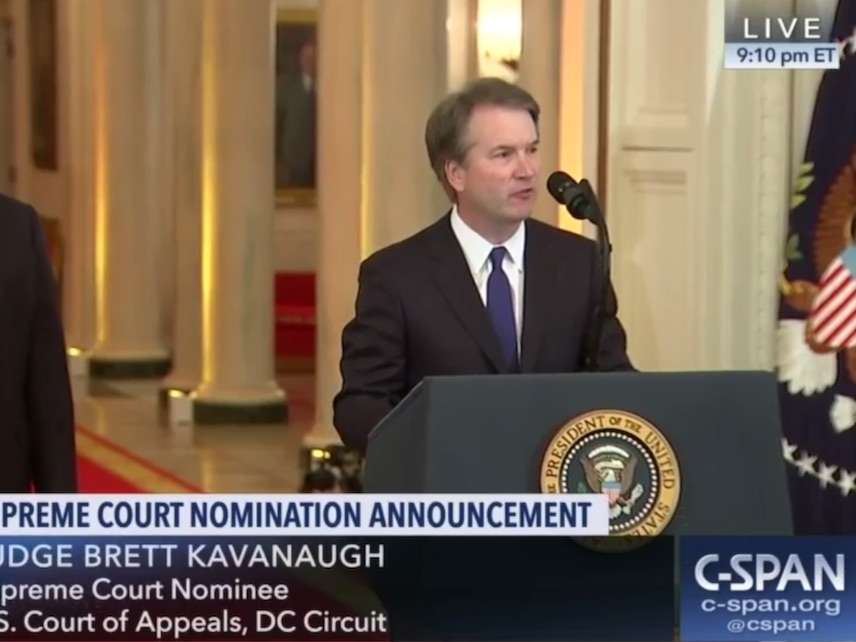5 Questions for SCOTUS Nominee Brett Kavanaugh
What the Senate Judiciary Committee should ask the Supreme Court nominee.

The Senate Judiciary Committee will hold confirmation hearings this week on the nomination of Brett Kavanaugh to serve as an associate justice of the United States Supreme Court.
Kavanaugh, 53, is a respected federal judge with many admirers in conservative legal circles. But there are still a number of unanswered questions when it comes to his jurisprudence. Here are five matters that I would like to hear Kavanaugh address as he faces the Senate Judiciary Committee in the coming days.
1. Congressional Power
The use of recreational marijuana is now legal in multiple states. Yet Congress continues to ban marijuana at the federal level, and the Supreme Court has upheld the federal marijuana ban as a lawful exercise of Congress's power to regulate interstate commerce. The Supreme Court did this in Gonzales v. Raich (2005), despite the fact that the medical marijuana at issue in that dispute was both grown and consumed entirely within the state of California. Do you believe that the federal authority to regulate interstate commerce is broad enough to allow Congress to ban a local activity that is legal under state law and that never crosses any state lines?
2. Executive Power
In February 2017, the Trump administration told the U.S. Court of Appeals for the 9th Circuit that President Trump's first executive order banning travelers from certain majority-Muslim countries was beyond the reach of "even limited judicial review" because the federal courts have no business taking "the extraordinary step of second-guessing a formal national-security judgment made by the President himself pursuant to broad grants of statutory authority." Do you agree that a president's executive orders should get a free pass from judicial review if the orders are purportedly connected to the president's "formal national-security judgment"? In your opinion, how deferential must the federal courts be to the executive branch when the president claims to be acting in the name of national security?
3. Unenumerated Rights
The Constitution lists various individual rights that the government is forbidden from violating, such as the right to free speech and the right to keep and bear arms. But the Constitution also refers to rights that it does not expressly list. For example, the 9th Amendment says, "the enumeration in the Constitution of certain rights shall not be construed to deny or disparage others retained by the people." Over the years, the Supreme Court has recognized and protected a number of such unenumerated rights, including the right to privacy, the right of parents to educate their children in private schools, and the right to gay marriage. In your view, is the Supreme Court ever justified in securing unenumerated rights from government infringement? And if not, should the Supreme Court overturn its applicable precedents and stop recognizing the unwritten right to privacy?
4. Judicial Restraint
In your 2011 dissent in Seven-Sky v. Holder, you argued that the federal courts should have abstained from ruling on the constitutional merits of the Patient Protection and Affordable Care Act because "by waiting, we would respect the bedrock principle of judicial restraint." The courts should be "cautious," you wrote, "about prematurely or unnecessarily rejecting the Government's Commerce Clause argument" in defense of Obamacare. "This legislation was enacted," you continued, "after a high-profile and vigorous national debate. Courts must afford great respect to that legislative effort and should be wary of upending it." Please explain your criteria for determining precisely when the judiciary is supposed to "afford great respect" to lawmakers and thus avoid "upending" their "legislative effort."
5. Searches and Seizures
In 2015, you wrote that the National Security Agency's bulk metadata collection program "is entirely consistent with the Fourth Amendment." Is that still your view today? Do you continue to believe that the Fourth Amendment suffers no violation when the federal government engages in the wholesale warrantless collection of every Americans' telephone record metadata?
The American people deserve to hear what Brett Kavanaugh has to say about these crucial constitutional issues. The members of the Senate Judiciary Committee should ask him about them during his SCOTUS confirmation hearings this week.


Show Comments (127)